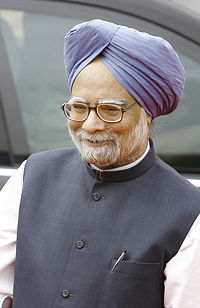|
 The Indian economy is ''is ticking along smoothly'' and is expected to touch 9 per cent and hold the price line at acceptable levels said Prime Minister Dr Manmohan Singh in New Delhi today. The Indian economy is ''is ticking along smoothly'' and is expected to touch 9 per cent and hold the price line at acceptable levels said Prime Minister Dr Manmohan Singh in New Delhi today.
Inaugurating the 80th annual general meeting of the Federation of Commerce and Industry (FICCI), the prime minister expressed confidence of sustained economic buoyancy on the back of last year's 9.6 per cent GDP growth despite ''distinct possibilities of the global economy, particularly the developed world, facing a downturn in the coming year.'' However the Dr Singh said that to some extent a major part of India's growth story was driven by domestic factors, particularly improved investment and consumption demand, though he cautioned that the country could not ''be completely insulated from chilly global winds that may blow in our direction.'' He expressed the hope that the FICCI AGM would ''show us how we can continue to maintain the dynamism of our growth process at home, in spite of such external concerns'' ''Government and business must be active partners in devising such a strategy and a road map,'' Dr Singh. Dr Singh complimented Indian business and enterprise for displaying their resilience in an increasingly integrated and competitive global economy with a new sense of confidence. ''When I come to gatherings like these I am no longer confronted by petitions, prayers or protests. Rather, I hear more about performance, potential and possibilities,'' said Dr Singh He also noted that the savings rate has almost touched 35 per cent of the GDP and the investment rate was at an all time peak of over 36 per cent, reflecting the faith of investors in the Indian economy ''Inward foreign direct investment has crossed $20 billion last year, a level unimaginable a few years ago,'' he commented. Comparison with the nineties
Commenting on the parallels on the economic situation during his tenure as finance minister (under Prime Minister P V Narsimha Rao) he noted though that era too witnessed similar optimism, but that dynamism was not sustained and after three years of above 7 per cent annual growth between 1992 and 1997, the economy slowed down considerably. He said it was a matter of satisfaction that the government had succeeded simultaneously on two fronts -.being able to accelerate economic growth substantially and being able ''to put in place the basic architecture necessary for ensuring that this growth will be broad based, more even, more socially inclusive and therefore, more sustainable in the medium term.'' To help expand this growth and make it more inclusive, he re emphasise four key aspects of the policy framework - agriculture and rural development; infrastructure; education; and health care. Admitting that the share of agriculture in the GDP had been declining, he said the importance of the sector could not be minimised fir the economy as it continued to support ''a significant proportion of our population and acts as a social safety net''. Therefore, he said the health of agriculture was vital for sustaining economic performance. To help the agricultural sector and the rural economy public investment in rural connectivity, including rural roads, rural telecommunication and rural electrification under Bharat Nirman programme had been increased, while the rural employment guarantee scheme ''has pumped significant additional purchasing power in to the hands of rural households'' he said. Infrastructure
Greater infrastructure investment with increased private sector participation he said would help raise GDP from 5 per cent in the 10th Plan to 9 per cent of GDP in the 11th Plan. The prime minister also said that the railways had seen a revolutionary transformation in the last four years with all performance on all fronts - revenues, operating ratios, cash surpluses and safety - having improved. He said private firms were already running container trains, with private investment in logistics parks, railway stations and in coach production and the two dedicated freight corridors, would prepare our railways for meeting the demands of future decades. Simultaneously the national highway programme had been expanded over the past four years with the construction-contract driven approach of the early years giving way to a genuine public private partnership approach through model concession agreements for BOT road contracts and a viability gap funding system. ''The planned investment of over Rs220,000 crore in roads over the next five years will be a major boost to our infrastructure – and of course, to our automobile sector of the economy as a whole, Dr Singh said. Similarly the power sector was seeing a major expansion and private participation in power generation had revived, particularly after the ultra mega power projects were launched last year. Dr Singh said, ''Overall, I see an increasing partnership between the public and private sectors in ensuring energy security for the country,''. Urban areas, he said, were getting unprecedented renewed attention with 63 cities getting a boost in urban infrastructure through the Jawaharlal Nehru Urban Renewal Mission, while education and healthcare have been given primacy with the outlay for education in the central gross budgetary support being raised from less than 8 per cent in the 10th Plan to over 19 per cent in the 11th Plan. All these initiatives, he said, should have a positive impact on the growth process and make it more inclusive, he said.
(Full text of Dr Manmohan Singh's address at FICCI's the 80th AGM)
|